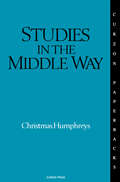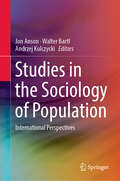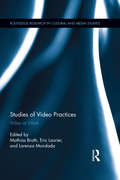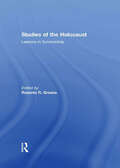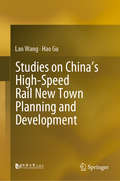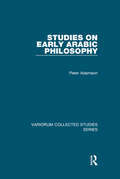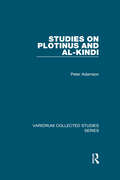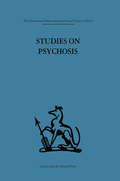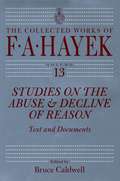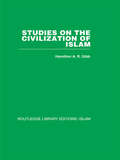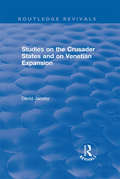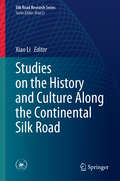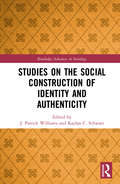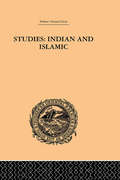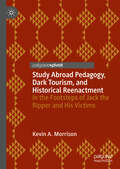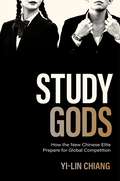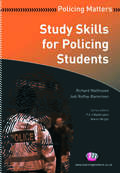- Table View
- List View
Studies in the Middle Way: Being Thoughts on Buddhism Applied
by Christmas HumphreysEmphasizes the inner life as a constant moving on and the mover as a pilgrim travelling along an ancient Way. This Way to ultimate Reality was called by Gautama the Buddha the Middle Way, the path between the introverted life of contemplation and the extrovert life of action in the world of men.
Studies in the Social and Cultural History of Modern Warfare: Memory and Migration in the Shadow of War
by Joy DamousiIn an engaging and original contribution to the field of memory studies, Joy Damousi considers the enduring impact of war on family memory in the Greek diaspora. Focusing on Australia's Greek immigrants in the aftermath of the Second World War and the Greek Civil War, the book explores the concept of remembrance within the larger context of migration to show how intergenerational experience of war and trauma transcend both place and nation. Drawing from the most recent research in memory, trauma and transnationalism, Memory and Migration in the Shadow of War deals with the continuities and discontinuities of war stories, assimilation in modern Australia, politics and activism, child migration and memories of mothers and children in war. Damousi sheds new light on aspects of forgotten memory and silence within families and communities, and in particular the ways in which past experience of violence and tragedy is both negotiated and processed.
Studies in the Social and Cultural History of Modern Warfare: Shell-Shock and Medical Culture in First World War Britain
by Tracey LoughranShell-Shock and Medical Culture in First World War Britain is a thought-provoking reassessment of medical responses to war-related psychological breakdown in the early twentieth century. Dr Loughran places shell-shock within the historical context of British psychological medicine to examine the intellectual resources doctors drew on as they struggled to make sense of nervous collapse. She reveals how medical approaches to shell-shock were formulated within an evolutionary framework which viewed mental breakdown as regression to a level characteristic of earlier stages of individual or racial development, but also ultimately resulted in greater understanding and acceptance of psychoanalytic approaches to human mind and behaviour. Through its demonstration of the crucial importance of concepts of mind-body relations, gender, willpower and instinct to the diagnosis of shell-shock, this book locates the disorder within a series of debates on human identity dating back to the Darwinian revolution and extending far beyond the medical sphere.
Studies in the Social and Cultural History of Modern Warfare: The First World War and German National Identity
by Jan VermeirenThe First World War and German National Identity is an original and carefully researched study of the coalition between Imperial Germany and Austria-Hungary during the First World War. Focusing on the attitudes taken by governmental circles, politically active groups, intellectuals, and the broader public towards the German-speaking population in the Habsburg Monarchy, Jan Vermeiren explores how the war challenged established notions of German national identity and history. In this context, he also sheds new light on key issues in the military and the diplomatic relationship between Berlin and Vienna, re-examining the German war aims debate and presenting many new insights into German-Hungarian and German-Slav relations in the period. The book is a major contribution to German and Central European history and will be of great interest to scholars of the First World War and the complex relationship between war and society.
Studies in the Sociology of Population: International Perspectives
by Walter Bartl Andrzej Kulczycki Jon AnsonThis book presents a cross section of the work and concerns of social demographers worldwide, covering a broad range of topics from social structure through population structure to social policy; from fertility and mortality through migration to the way in which organisations deal with the demographic environment in which they operate. Topics addressed also include morbidity and health profiles and transitions, as well as policies and programs concerned with these and other issues. <P><P> The volume touches on some of the major links between population and societal dynamics. It addresses demographic patterns and issues from micro-level, meso-level, and macro-level perspectives and helps put into focus the past, present and future of the mutual relations between population dynamics and societal responses. <P><P> With a unique introductory chapter discussing the global unevenness of population growth today, its associations with inequality and the challenges it presents for the future, and a truly international approach to social and demographic change and policy responses, this book will serve as a valuable resource for professionals and students in sociology, demography, social policy and local governance.
Studies in the Theory of Ideology
by John B. ThompsonThe study of ideology has traditionally been concerned not only with political ideas and doctrines, but also with the ways in which social relations are sustained through the representation of institutions and events. These traditional concerns have been transformed in recent years by investigations into the nature of language and its role in social life. Exploring the links between language and ideology has become one of the most pressing tasks of social and political analysis. In this volume John B. Thompson examines some of the outstanding contemporary contributions to the study of ideology. He focuses primarily on European social theorists and philosophers, providing concise and critical appraisals of their work. In addition to asessing the contributions of well-known thinkers, such as Jurgen Habermas and Paul Ricoeur, Thompson introduces the reader to a rich variety of authors who habe been neglected in the English-speaking world: Cornelius Castoriadis, Claude Lefort, Pierre Bourdieu, Michel Pecheux, Jean Pierre Faye. This work of these authors ia analyzed with a constructive aim: through a sympathetic assessment of their views, Thompson formulates the elements of a novel account of ideology. By addressing substantive and methodological issues as well as abstract questions of justification and critique, this account seeks to integrate sociological and philosophical considerations in a unified framework for the analysis of ideology. Studies in the Theory of Ideology will be essential reading for anyone intersted in the most important developments in European philosophy and modern social thought. This title is part of UC Press's Voices Revived program, which commemorates University of California Press's mission to seek out and cultivate the brightest minds and give them voice, reach, and impact. Drawing on a backlist dating to 1893, Voices Revived makes high-quality, peer-reviewed scholarship accessible once again using print-on-demand technology. This title was originally published in 1984.
Studies of Literature from Marginalized Nations in Modern China, with a Focus on Eastern European Literature
by Binghui SongThis book presents the first systematic study of the 100-year history of translation, research, reception, and influence of Central and Eastern European literature in China from the late Qing Dynasty to the end of the twentieth century. This study of Eastern European literature from the perspective of Sino-foreign literary relations is based on extensive research into the translation and reception of Central and Eastern European writers such as Milan Kundera, Sándor Petőfi, Henryk Sienkiewicz, Julius Fucik, and Bertolt Brecht. Since the late nineteenth century, the major Chinese writers have paid special attention to the literature of the marginalized Eastern European nations when they have to translate from translations since few of them understand Eastern European languages. The book seeks to identify what attracted the founders of new Chinese literature to Eastern European literature and to define its unique significance for the construction of modern Chinese literature.
Studies of Video Practices: Video at Work (Routledge Research in Cultural and Media Studies #63)
by Lorenza Mondada Mathias Broth Eric LaurierThe last two decades have seen a rapid increase in the production and consumption of video by both professionals and amateurs. The near ubiquity of devices with video cameras and the rise of sites like YouTube have lead to the growth and transformation of the practices of producing, circulating, and viewing video, whether it be in households, workplaces, or research laboratories. This volume builds a foundation for studies of activities based in and around video production and consumption. It contributes to the interdisciplinary field of visual methodology, investigating how video functions as a resource for a variety of actors and professions.
Studies of the Holocaust: Lessons in Survivorship
by Roberta R. GreeneIt has been more than sixty years since the end of World War II and the liberation of the survivors of the Holocaust. Since then, many rich personal and historical accounts have been written of the horrific events of those times. Mental health workers have strived to give survivors solace for their loss, and help them return to a meaningful life. Meanwhile, scholars continue to ponder the inexplicable facts of genocide.Yet Studies of the Holocaust: Lessons in Survivorship continues to be timely. Based on more than 100 interviews in nine U.S. locations, the book offers a powerful view of survivors’ hope, determination, and resilience. Study questions elicited survival strategies, and revealed how, following the war, survivors overcame the horrors of the Holocaust, formed families, built careers, and gave to their communities. Survivor quotes taken from these interviews illuminate how the survivors maintained competence into old age. While memories of pain persist, accomplishments are acknowledged, and provide lessons for students of human development, mental health practitioners, and the general public. This book was previously published as a special issue of Journal of Human Behaviour and the Social Environment.
Studies on China’s High-Speed Rail New Town Planning and Development
by Lan Wang Hao GuThis book focuses on high-speed rail (HSR) and new town planning and development related to HSR, approaching the issue from three different perspectives: economic cooperation at a regional level; HSR-based economic growth point at a city level; and mixed land use and building environment in the periphery area of HSR stations. On the basis of simulations and case studies, it proposes practical planning principles and suggestions for area development, providing planners with a theoretical framework to incorporate the transportation system into new town planning. It also serves as a valuable reference source for the authorities, enabling them to make evidence-based and rational decisions.
Studies on Early Arabic Philosophy (Variorum Collected Studies #1054)
by Peter AdamsonPhilosophy in the Islamic world from the 9th to 11th centuries was characterized by an engagement with Greek philosophical works in Arabic translation. This volume collects papers on both the Greek philosophers in their new Arabic guise, and on reactions to the translation movement in the period leading up to Avicenna. In a first section, Adamson provides general studies of the ’formative’ period of philosophy in the Islamic world, discussing the Arabic reception of Aristotle and of his commentators. He also argues that this formative period was characterized not just by the use of Hellenic materials, but also by a productive exchange of ideas between Greek-inspired ’philosophy (falsafa)’ and Islamic theology (kalÄm). A second section considers the underappreciated philosophical impact of Galen, using Arabic sources to understand Galen himself, and exploring the thought of the doctor and philosopher al-RÄzÄ«, who drew on Galen as a chief inspiration. A third section looks at al-FÄrÄbÄ« and the so-called ’Baghdad school’ of the 10th century, examining their reaction to Aristotle’s Metaphysics, his epistemology, and his famous deterministic ’sea battle’ argument. A final group of papers is devoted to Avicenna’s philosophy, which marks the beginning of a new era of philosophy in the Islamic world.
Studies on Plotinus and al-Kindi
by Peter AdamsonThis book collects 15 papers on the greatest philosopher of late antiquity and founder of Neoplatonism, Plotinus (d.270), and the founding figure of philosophy in the Islamic world: al-KindÄ« (d. ca. 873). A number of the contributions focus on the text that joins the two: the so-called Theology of Aristotle, in fact an Arabic version of Plotinus’ Enneads produced in al- KindÄ«’s translation circle. Across several papers, Adamson argues that this translation is best understood as a reinterpretation of Plotinus designed to appeal to contemporary readers in the culture of the ’AbbÄsid era. Two contributions also analyze the notes on the Theology written by the great Avicenna. Other papers look at aspects of al-KindÄ«’s own thought, exploring his ideas concerning metaphysics, free will astrology, and optics. The traditions of Plotinus and al-KindÄ« are also treated, with papers on Plotinus’ student Porphyry and his Arabic reception, and on followers of al-KindÄ«. Adamson argues that we can identify what he calls a 'Kindian tradition' in the 9th-10th centuries. He discusses the philosophical presuppositions of this movement, and the use of al-KindÄ«’s ideas made by one particular representative of the Kindian tradition, the Persian thinker Miskawayh.
Studies on Psychosis: Descriptive, psycho-analytic and psychological aspects
by Thomas FreemanTavistock Press was established as a co-operative venture between the Tavistock Institute and Routledge & Kegan Paul (RKP) in the 1950s to produce a series of major contributions across the social sciences. This volume is part of a 2001 reissue of a selection of those important works which have since gone out of print, or are difficult to locate. Published by Routledge, 112 volumes in total are being brought together under the name The International Behavioural and Social Sciences Library: Classics from the Tavistock Press. Reproduced here in facsimile, this volume was originally published in 1965 and is available individually. The collection is also available in a number of themed mini-sets of between 5 and 13 volumes, or as a complete collection.
Studies on the Abuse & Decline of Reason: Text and Documents (The Collected Works of F.A. Hayek)
by F.A. HayekStudies on the Abuse and Decline of Reason is a series of fascinating essays on the study of social phenomena. How to best and most accurately study social interactions has long been debated intensely, and there are two main approaches: the positivists, who ignore intent and belief and draw on methods based in the sciences; and the nonpositivists, who argue that opinions and ideas drive action and are central to understanding social behavior. F. A. Hayek’s opposition to the positivists and their claims to scientific rigor and certainty in the study of human behavior is a running theme of this important book. Hayek argues that the vast number of elements whose interactions create social structures and institutions make it unlikely that social science can predict precise outcomes. Instead, he contends, we should strive to simply understand the principles by which phenomena are produced. For Hayek this modesty of aspirations went hand in hand with his concern over widespread enthusiasm for economic planning. As a result, these essays are relevant to ongoing debates within the social sciences and to discussion about the role government can and should play in the economy.
Studies on the Civilization of Islam (Princeton Legacy Library #685)
by H.A.R. GibbOriginally published in 1962, this book presents important studies on the history, literature and religion of the Islamic peoples as well as an appraisal of contemporary intellectual currents in the Middle East. Part I interprets the basic political and cultural development in medieval Islam, set in the context of its growth from a religious movement in the Arabian peninsula to an imperial structure extending from the Atlantic Ocean to the borders of China. Part II includes studies of Islamic institutions, philosophy and religion. The close relationship of Islam to Western traditions through the Biblical and Greek heritages is emphasized and the factors which have moulded unique and distinctive institutions are considered.
Studies on the Crusader States and on Venetian Expansion: Studies On The Crusader States And On Venetian Expansion (Routledge Revivals)
by David JacobyThis title was first published in 2001. This volume is a sequal to the two published in the Variorum Reprints series,in 1975 and 1979 respectively under the following titles: Société et démographie.
Studies on the History and Culture Along the Continental Silk Road (Silk Road Research Series)
by Xiao LiThis book presents outstanding articles addressing various aspects related to the ancient Silk Road, in particular the cultural, political, and economic interactions that took place among the civilizations and cultures on the Eurasian continent. In addition, the articles help to reveal the hallmark features of cultural communication in Inner Asia in different historical periods. The book develops a new approach to studying the civilizations of the Silk Road, promotes interdisciplinary and multi-dimensional research, sets a new direction for Chinese ancient classics and western sinology, and presents the latest discoveries, including both archaeological finds and historical documents.
Studies on the Social Construction of Identity and Authenticity (Routledge Advances in Sociology)
by J. Patrick Williams Kaylan C. SchwarzAs identity and authenticity discourses increasingly saturate everyday life, so too have these concepts spread across the humanities and social sciences literatures. Many scholars may be interested in identity and authenticity but lack knowledge of paradigmatic or disciplinary approaches to these concepts. This volume offers readers insight into social constructionist approaches to identity and authenticity. It focuses on the processes of identification and authentication, rather than on subjective experiences of selfhood. There are no attempts to settle what authentic identities are. On the contrary, contributors demonstrate that neither identities nor their authenticity have a single or fixed meaning. Chapters provide exemplars of contemporary research on identity and authenticity, with significant diversity among them in terms of the identities, cultural milieu, geographic settings, disciplinary traditions, and methodological approaches considered. Contributors introduce readers to a number of established and emerging identity groups from sites around the world, from yogis and punks to fire dancers and social media influencers. Their conceptual work stretches from the micro-analytic to the ethno-national as authors employ a variety of qualitative methods including ethnographic fieldwork, interviewing, and the collection and analysis of naturally-occurring interactions. Several of the chapters look directly at identification and authentication while others focus on the social and cultural backdrops that structure these practices – what unites them is the adoption of social constructionist sensibilities. This book will appeal to anyone interested in understanding identity and authenticity.
Studies: Indian And Islamic
by BukhshFirst Published in 2000. Routledge is an imprint of Taylor & Francis, an informa company.
Studio Studies: Operations, Topologies & Displacements (CRESC)
by Alex Wilkie Ignacio FaríasConsider the vast array of things around you, from the building you are in, the lights illuminating the interior, the computational devices mediating your life, the music in the background, even the crockery, furniture and glassware you are in the presence of. Common to all these objects is that their concrete, visual and technological forms were invariably conceived, modelled, finished and tested in sites characterised as studios. Remarkably, the studio remains a peculiar lacuna in our understanding of how cultural artefacts are brought into being and how ‘creativity’ operates as a located practice. Studio Studies is an agenda setting volume that presents a set of empirical case studies that explore and examine the studio as a key setting for aesthetic and material production. As such, Studio Studies responds to three contemporary concerns in social and cultural thought: first, how to account for the situated nature of creative and cultural production; second, the challenge of reimagining creativity as a socio-materially distributed practice rather than the cognitive privilege of the individual; and finally, to unravel the parallels, contrasts and interconnections between studios and other sites of cultural-aesthetic and technoscientific production, notably laboratories. By enquiring into the operations, topologies and displacements that shape and format studios, this volume aims to demarcate a novel and important object of analysis for empirical social and cultural research as well to develop new conceptual repertoires to unpack the multiple ways studio processes shape our everyday lives.
Study Abroad Pedagogy, Dark Tourism, and Historical Reenactment: In the Footsteps of Jack the Ripper and His Victims
by Kevin A. MorrisonThis book is a genre-breaking response to the literature on study abroad. It stakes claim to an uncharted space between reflective pedagogy, public history studies, and investigations into dark tourism. Drawing on the author’s experience of teaching short-term summer programs and courses in London between 2011 and 2018 that focused wholly or in part on the Whitechapel murders of 1888, the book analyzes experiential learning in the study abroad context. The book is informed by the instructor’s reflections; students’ informal essays and anonymous evaluations; and the scholarship of teaching and learning. It begins by situating programs and courses on the Whitechapel murders in the context of debates about overseas and experiential learning. It then proceeds to discuss the constraints to and possibilities for devising study abroad programs to include graduate students in humanistic disciplines; assignments and classroom activities utilized, including those with a reenactment component; the ethical complexities of teaching at dark sites; and the pedagogical implications of learning about Jack the Ripper in an age of terror. It concludes with reflections on the differences between study abroad programs and courses in cultivating students’ global-mindedness.
Study Gods: How the New Chinese Elite Prepare for Global Competition (Princeton Studies in Contemporary China #15)
by Yi-Lin ChiangHow privileged adolescents in China acquire status and why this helps them succeed Study Gods offers a rare look at the ways privileged youth in China prepare themselves to join the ranks of the global elite. Yi-Lin Chiang shows how these competitive Chinese high schoolers first become “study gods” (xueshen), a term describing academically high-performing students. Constant studying, however, is not what explains their success, for these young people appear god-like in their effortless abilities to excel. Instead, Chiang explores how elite adolescents achieve by absorbing and implementing the rules surrounding status.Drawing from eight years of fieldwork and extensive interviews, Chiang reveals the important lessons that Chinese youth learn in their pursuit of elite status. They understand the hierarchy of the status system, recognizing and acquiring the characteristics that are prized, while avoiding those that are not. They maintain status by expecting differential treatment and performing status-based behaviors, which guide their daily interactions with peers, teachers, and parents. Lastly, with the help of resourceful parents, they rely on external assistance in the face of potential obstacles and failures. Chiang looks at how students hone these skills, applying them as they head to colleges and careers around the world, and in their relationships with colleagues and supervisors.Highlighting another facet of China’s rising power, Study Gods announces the arrival of a new generation to the realm of global competition.
Study Skills for Geography, Earth and Environmental Science Students
by Pauline E KnealeThere are moments in everyone's degree when you are expected to do something unfamiliar and daunting - present a seminar, go on a fieldtrip, create a wiki page, lead a lab team - and how to do it or what to expect is unclear. Studying at university requires a different approach from studying at school and this book explains this transition. Packed with practical hints, study tips, short cuts, real-life examples and careers advice, this book will prove invaluable throughout your geography, earth science or environmental science degree. Designed for all geography, earth science and environmental science students, this book provides guidance on: time management and effective research constructing essays and creating arguments giving presentations confidently undertaking fieldwork and laboratory work avoiding plagiarism and citing references correctly using e-technologies such as blogs and your university's VLE online assessment and peer feedback. This guide also explains the role of the academic and how it differs from that of a school teacher, and prepares you for the world of work by showing how the skills you learn at university today can be used in your career choice of tomorrow.
Study Skills for Policing Students (Policing Matters Series)
by Richard Malthouse Jodi Roffey-BarentsenThis text provides an accessible and up to date guide to study skills for all those undertaking degrees and foundation degrees in policing. It will also be relevant to degree courses in criminology and criminal justice. Efficient study skills pave the way to successful learning. This book helps policing students with all aspects of their studies including identifying how they learn best, effective note-taking, how to be critical and analytical in their reading, writing and thinking, how to carry out research and writing a final dissertation.
Study Skills for Social Workers (SAGE Study Skills Series)
by Christine Stogdon Robin Kiteley′The book is completely student focused. I envisage students having the text on their desks when they attempt their written work, and this is very much how a study guide should be used′ - Professor Keith Popple, London South Bank University Study Skills for Social Workers offers an accessible insight into the practical use of skills for study in a professional social work context. Engaging with students on their journey through the undergraduate or postgraduate qualifying course, it uses relevant case material from academic and social work perspectives to demonstrate the connection between study and practice. The book is comprehensive in its coverage of the core study skills, including guidance on: Effective writing Successful communication Reflective study E-learning Learning in the workplace Understanding feedback. Written in a student-friendly style, Study Skills for Social Workers is interspersed with activities and exercises to enable students to practice and improve their skills as they move through the text. Also included is a glossary, and model answers to sample questions. SAGE Study Skills are essential study guides for students of all levels. From how to write great essays and succeeding at university, to writing your undergraduate dissertation and doing postgraduate research, SAGE Study Skills help you get the best from your time at university. Visit the SAGE Study Skills hub for tips, quizzes and videos on study success!
